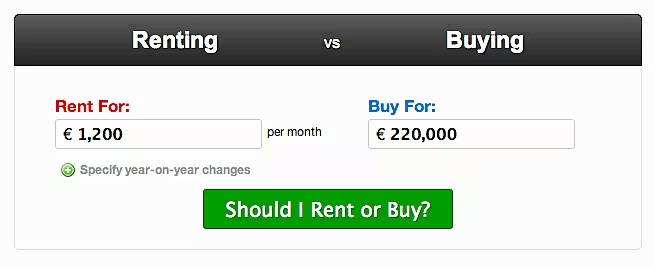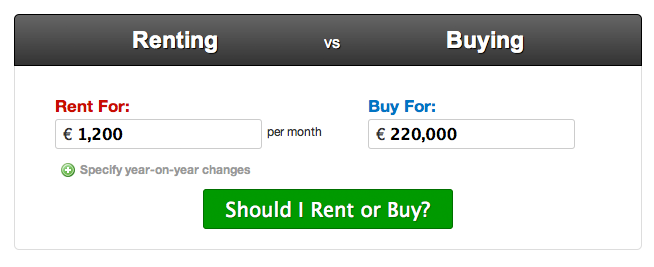The basic premise of renting or buying is not simply about a comparison of gross cost of one versus gross cost of another. You have to factor in interest rates, property value changes, changes in the price of renting and taxation considerations. We also need to consider the term or amount of time.

In our calculator we take a snapshot of the position in year 10. Granted, mortgages are taken out for far longer terms but to look into the future beyond a decade introduces too much uncertainty. Furthermore, the average life of a mortgage is less than 10 years and while people may not be buying to move, they still may do so and in order to create a scenario we look at three broad positions:
- Purchase in the here and now
- Wait 5 years then purchase
- Don't buy for 10 years then purchase
The 'rent forever' option isn't included, although for cost purposes you can consider the cost (take out the capital outlay) from choice 3 and just work with that.
Taxation is not just about the two obvious ones of Rent Relief or Tax Relief at Source – we also have to factor in Deposit Interest Retention Tax (DIRT) on savings (assuming that people keep the difference liquid rather than investing in a pension). The general algorithm is as follows: You enter a purchase price and a rent, in order to make it relevant it is best to consider a rent in the same area for a comparable property as that which you are calculating the purchase.
This ensures 'like for like' comparison. Then (default rate is 5%) you enter an 'average interest rate' that you expect. From there you can enter the changes you think will occur in rental prices (up or down) and in property prices (up or down). This gives a more 'live' version of what might happen in the future because prices are dynamic, it also gives you the freedom of forming your own calculation based upon your own opinions rather than making strict linear assumptions about anything.
So in one instance prices might drop every year but rent stays static, or they might drop, flatten then rise while rent rises then drops – play around with it and create your own scenarios, the point is that we don't want to restrict results based upon our own pre-determined assumptions.
In order to make a fair comparison we also assume that the person who has a deposit doesn't (if they don't purchase) turn around and blow that money, instead it goes on deposit. What we don't do is factor in any bias in favour of renting or buying as an 'additional saving'.
The calculator takes a market leading 5 year deposit rate and then increase that rate by 5% every year from year 5 to year 10. On the mortgage rate we take whatever your 10 year rate assumption is and add on 3% in year 5 (assuming that a functioning yield curve will mean higher rates at some point). It is also factored over a 25 year rather than 30 year period so that the comparisons will have the same end date – if a person takes out a 30 year loan in year one then a 25 year loan in year 5 is the proxy, as is a 22 year loan in year 8 for instance, otherwise you are comparing different time periods and have to discount to make relevant comparisons (otherwise in year 30 the buyer in year 1 is now living mortgage free while the buyer in year 5 is still paying a loan off etc.).
On the term front: people may argue that the default should be 20 years or 25 years from a prudence perspective, that point is fine for argument's sake, but in reality 35 years is actually the most popular term for first time buyers (often a mortgage changes during it's life and is repaid or prepaid before the end date set at the start), so we go with one slightly more conservative than that which is actually used in real life (30yrs).
Any calculation like this is subject to market volatility, but we'll let you enter your own price changes, it is subject to changes in taxation on several fronts, and of course there are events that may occur in year 15 that we can't consider because it doesn't look beyond a decade; anybody who has a working crystal ball that can see even 3 years down the road has a job waiting for them, never mind 20 years!
Visit the Rent or Buy calculator here.





